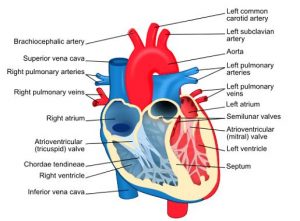Heart disease is an umbrella term for any type of disorder that affects the heart. Heart disease means the same as cardiac disease but not cardiovascular disease. Cardiovascular disease refers to disorders of the blood vessels and heart, while heart disease refers to just the heart.
Examples of heart disease include:
Angina – also known as angina pectoris, occurs when an area of heart muscle does not get enough oxygen. The patient experiences chest discomfort, tightness or pain. Angina is not technically a disease, but rather a symptom of coronary artery disease. Lack of oxygen to the heart muscle is usually caused by the narrowing of the coronary arteries because of plaque accumulation (atherosclerosis).
Arrhythmia – an irregular heartbeat.
- Tachycardia is when the heart beats too fast
- Bradycardia is when the heart beats too slowly
- Premature contraction is when the heart beats too early
- Fibrillation is when the heart beat is irregular
Arrhythmias are problems with heart-rhythm. They happen when the heart’s electrical impulses that coordinate heartbeats do not work properly, making the heart beat in a way it should not, either too fast, slowly or erratically.
Irregular heartbeats are common, we all experience them. They feel like a fluttering or a racing heart. However, when they veer too far from normal heartbeat or occur because of a damaged or weak heart, they need to be taken more seriously and treated. Irregular heartbeats can become fatal.

Diagram of the heart. Blue parts indicate de-oxygenated blood pathways while red parts indicate oxygenated pathways
Congenital heart disease – this is a general term for some birth defects that affect how the heart works. Congenital means you are born with it. In the UK it is estimated that 1 in every 1,000 babies are born with some kind of congenital heart disease. Examples include:
- Septal defects – there is a hole between the two chambers of the heart. This condition is sometimes called hole in the heart.
- Obstruction defects – the flow of blood through various chambers of the heart is partially or even totally blocked
- Cyanotic heart disease – not enough oxygen is pumped around the body because there is a defect (or some defects) in the heart.
Coronary artery disease – the coronary arteries, which supply the heart with nutrients, oxygen and blood become diseased or damaged, usually because of plaque deposits (cholesterol-containing deposits). Plaque accumulation narrows the coronary arteries and the heart gets less oxygen.
Cardiovascular Disease
Cardiovascular disease (CVD) is a general term that describes a disease of the heart or blood vessels.
Blood flow to the heart, brain or body can be reduced as a result of a:
- blood clot (thrombosis)
- build-up of fatty deposits inside an artery, leading to the artery hardening and narrowing (atherosclerosis)
Types of CVD
There are four main types of CVD:
- coronary heart disease
- stroke
- peripheral arterial disease
- aortic disease
Each type is discussed in more detail below.
Coronary heart disease
Coronary heart disease (CHD) occurs when your heart’s blood supply is blocked or interrupted by a build-up of fatty substances (atheroma) in the coronary arteries. The coronary arteries are the two major blood vessels that supply your heart with blood.
If your coronary arteries become narrow due to a build-up of atheroma, the blood supply to your heart will be restricted. This can cause angina (chest pains). If a coronary artery becomes completely blocked, it can cause a heart attack.
Stroke
A stroke is a serious medical condition that occurs when the blood supply to the brain is disturbed.
Like all organs, your brain needs a constant supply of oxygen and nutrients to function properly. This is provided by the blood, so if your blood flow is restricted or stopped, brain cells will begin to die. This can lead to brain damage and possibly death.
Therefore, a stroke is a medical emergency and prompt treatment is essential. The sooner a person receives treatment, the less damage is likely to occur.
For more information on heart related symptoms of to make an appointment to speak to a cardiologist then contact Phyathai Sriracha Hospital Heart Center on direct International number: 087-1000-990 Email: [email protected] www.phyathai-sriracha.com










